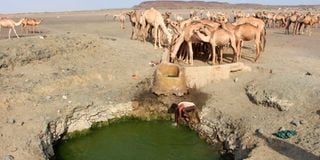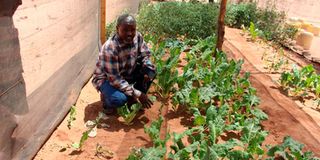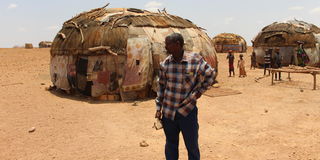Premium
Thousands hit by worsening drought in Marsabit County

A herdsman draws water for his camels in Maikona Village, Marsabit County at Maikona Water Point on March 15, 2022.
Marsabit residents are feeling the effects of drought. People and livestock are dying. The only water point in Maikona village cannot serve all the surrounding villages adequately. The borehole was sunk by Maikona Catholic Centre.
Maikona means ‘a place of water’ in the Gabra language. It is 376 kilometres from Marsabit Town. For a long time, most rivers have remained dry. People and their livestock are starving.
From the Catholic Mission Centre and Maikona ACK Church, one can see a few men driving hundreds of camels to the Maikona water point, the only one in the area. The herders ignore the carcass of a camel a few meters away, a stark evidence of the effects of drought.
Most herders have resigned to fate. Camels, their main source of livelihood, are dying due to lack of pasture.

A man examines the carcass of a camel a few meters from Maikona Water Point in Marsabit County on March 15, 2022
At Maikona Catholic Centre, at least 500 people are gathered. They are waiting for relief food. They look tired. Some of them had walked for dozens of kilometers to get food rations.
By 8am, the temperatures had hit 32 degrees Celsius. The sick and the old could not walk to the food distribution centre.
Later, the team travelled to another village 18 kilometers away to distribute food to over 200 families in their manyattas.
The Marsabit County Food Drive is courtesy of Faith Evangelistic Ministries under the leadership of Rev. Teresia Wairimu Kinyanjui, Jubilee Christian Church under the leadership of Bishop Allan & Rev. Cathy Kiuna and Eagle’s Faith Christian Center under the leadership of Pastor George Mathu.
Rev Kinyanjui has called on other well-wishers to donate foodstuffs and other basic commodities.

Rev John Guyo of ACK Maikona at a greenhouse in the local church.
Food distribution centres near Isiolo are Korr, Maikona, Loyangalani and North Korr. North Horr is the farthest centre. It is220 km from Marsabit.
The drought situation in Marsabit is serious. The residents are wondering when the rains will come. Rev John Guyo of Maikona ACK says they are not sure if their animals will survive.
“We are grateful to the Faith Evangelistic Ministry, (FEM Family Church Karen), Eagle’s Faith Christian Centre and Jubilee Christian Church organisations for coming to our aid,” Rev Guyo said.

Rev Boniface Kaunga of Faith Evangelistic Ministry distributes food at Lonyangalani in Marsabit County on march 15,2022.
“Sometimes, we go for days without food. We don’t know what we shall do about our livestock,” said Rev Guyo.
The roads are bad. Vehicles often get stuck in the sandy roads and seasonal rivers.
The residents here rely on food donations from non-governmental organisations and churches. But what these organisations give is only a drop in the ocean, says Rev Guyo.
“If we have water, the locals can try farming, I have introduced greenhouse farming with women groups, this needs a lot of financial support’’ he said.
In Maikona, the sub county headquarters, he says only the fittest can survive.
The Gabra who keep camels, and goats have devised ways to cope with the harsh desert conditions.
North Horr
Herdsmen across the rocky hills in Maikona, North Horr, cross the Chalbi Desert in a caravan to take their camels and goats for water at Maikona Water Point.
Paul Forole Karani, a local community mobiliser, said women groups can be assisted and trained on farming. Mr Forole said this is a long term project that can eradicate poverty in the area.
The herders have to trek for more than 45-50 to reach the water point.
Maikona Catholic Parish Fr Istoc Claudia said the biggest problem Maikona residents are facing is lack of water. He said the church was working with other government agencies to dig more boreholes.

Mr Charles Kiarie of Faith Evangelistic Ministry distributes food at Loyangalani in Marsabit County on March 15, 2022.
Mr Mathew Molu from Maikona Catholic Centre said camels are dying from the effects of drought. Rev Fr Dennis Mbogo Parish Priest North Horr Parish in Marsabit says a total of 1,000 families have received food donations including maize flour, cooking fat, milk and rice.
Last Wednesday, the team headed to Loiyangalani to distribute foodstuffs to over 500 needy families.

Rev John Guyo of ACK Maikona at Maikona village, Marsabit County, on March 15.
Apart from the prevailing drought, there is also a perennial problem of insecurity. Inter-community fighting over livestock theft and grazing pastures.
At Loiyangalani next to Lake Turkana, one would expect that the situation is better due to fish trade. This is not so. The fish is expensive. A small fish fillet costs Sh700. Local fishermen say the fish have migrated to the deep waters where their boats and canoes cannot reach.
Fruits and vegetables are also too expensive.




